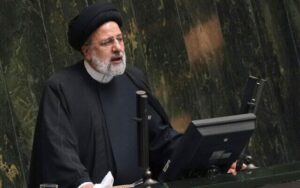After the two nations’ reconciliation, King Salman of Saudi Arabia has extended an invitation to Iranian President Ebrahim Raisi to visit the country, an Iranian official has reported.
Mohammad Jamshidi, the Iranian president’s deputy chief of staff for political affairs, tweeted on Sunday that “Raisi accepted the offer” after the King of Saudi Arabia “welcomed the deal between the two brotherly countries” and “invited him to Riyadh”.
The two regional powerhouses struck a deal on March 10 to mend their ties seven years after they were severed through Chinese mediation.
Following the Saudi death of Shia preacher Nimr al-Nimr in 2016, demonstrators in Iran assaulted Saudi diplomatic missions, which was just one of several flashpoints between the two long-standing regional foes.
With the implementation of the agreement, the mostly Sunni Muslim Saudi Arabia and the Shia-majority Iran are anticipated to restore their embassies and posts within two months and carry out security and economic cooperation agreements that were inked more than 20 years ago.
On Sunday, Hossein Amir-Abdollahian, the foreign minister of Iran, informed reporters that the two nations had decided to arrange a meeting of their top diplomats.
Without elaborating, he continued by saying that three places for the talks had been proposed.
“According to Amir-Abdollahian, three venues for the meeting were provided by the Iranians. Now, rather than through the Chinese, the exchange was conducted through the Swiss embassy. This may suggest that there are currently many channels open between Saudi Arabia and Iran, according to Hashem.
The detente between Iran, which has been at war with Western countries over its nuclear operations, and Saudi Arabia, the largest oil exporter in the world, has the potential to transform relations in a region that has been plagued by unrest for decades.
In several war zones, notably Yemen, where the Houthi rebels are allied with Tehran and a military coalition supporting the government is headed by Riyadh, Iran and Saudi Arabia support opposing sides.
Moreover, the two groups compete for influence in Iraq, Lebanon, and Syria.
Although the United Arab Emirates and Kuwait recently reestablished ties with Tehran, several Gulf nations followed Riyadh’s lead in 2016 and cut back on their relations with Tehran.
Amir-Abdollahian added that Tehran hoped measures would be taken to normalize relations with Bahrain, a key Saudi ally that cut off diplomatic ties with Iran in 2016 after Riyadh did so.
Bahrain has in the past charged Iran with supporting and training a Shia-led rebellion in the Sunni-ruled country’s attempt to overthrow the Manama administration. Iran disputes this.
“Two months ago, a deal was made to allow technical delegations from Bahrain and Iran to visit each other’s embassies. The essential steps to restore the embassies would be taken if we remove any remaining barriers between Iran and Bahrain, Amir-Abdollahian stated.
Manama didn’t immediately respond with a statement.
Bahrain and other Gulf Arab nations applauded the deal reached by Riyadh and Tehran to normalize relations.
After a six-year hiatus, Iran received an Emirati ambassador in September, while a month earlier, it announced that Kuwait had dispatched its first ambassador to Tehran since 2016.

Another indication of the changing relations in the region was the meeting that Iran’s top security official, Ali Shamkhani, had on Thursday in Abu Dhabi with President of the United Arab Emirates, Mohammed bin Zayed Al Nahyan.




